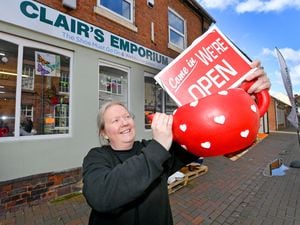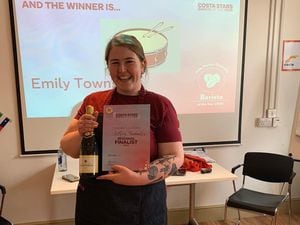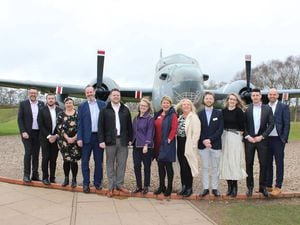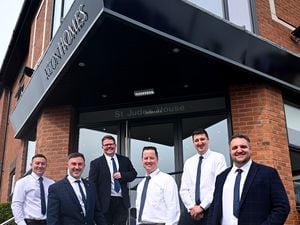Go Carz ringing the changes for booking your taxi
Surrounded by dog-eared phone books and road maps, the taxi controller carries on filing her nails as she takes a call.
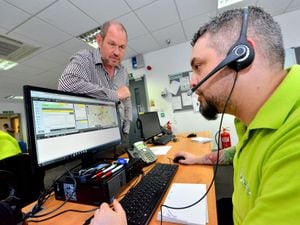
“Anyone free for a trip to the airport?” she bellows across the tiny office, grabbing the attention of a driver who had been dozing off in his chair reading the newspaper.
At least that is the way it is portrayed in the soap operas. But the reality of what goes on behind the scenes in the modern taxi industry is very different indeed.
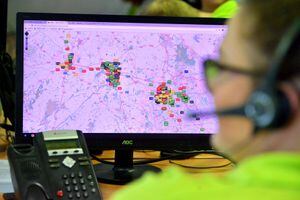
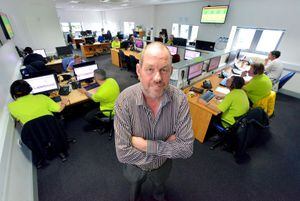
Tucked away on a business park on the outskirts of Shrewsbury is the nerve centre of Go Carz, one of the largest taxi firms in the West Midlands. The hi-tech centre, which cost £200,000 when it opened at the start of this year, is not dissimilar to the control centres used by the fire or ambulance services. A total of 60 staff are employed at the base, handling up to 100,000 calls every week, and managing 1,100 cars based mainly around Shropshire, Walsall and Wolverhampton.
“We do take calls from places like Stafford or Dudley, we go as far north as Whitchurch, but most of our calls are around Shrewsbury, Telford, Walsall and Wolverhampton,” says managing director Carl Wilday, who founded the company in 1995.
All the company’s calls will be routed through the centre on the Battlefield Enterprise Park, and the locations and movements of drivers are tracked on a computer in front of the call handlers.
As he speaks, shift manager Wayne Turner takes a call from a customer wanting a taxi to the medical centre.
“Go Carz, how may I help you,” says the 31-year-old from Shrewsbury. Immediately he begins typing the customer’s address, which locates all the taxis in the vicinity on a map. He then inputs the address of the doctors’ surgery and immediately details of the job is transmitted to small tablet-like computer devices which are installed in all of the company’s taxis.
“If it is a number we recognise, somebody who has called before, the computer will flag up the most common addresses we have been called to for that customer, and we will ask if that is where they want to go,” says Wayne.
“For example, if I put my phone number in there, my home address comes up.
Once a call comes in, drivers in the vicinity are invited to “bid” for the job – fares are normally allocated by a piece of computer software which tries to ensure a fair distribution of work based on who bid for it first, and also whether the driver has had their share of jobs during the day. Once the driver has accepted a fare, the log moves onto a different page, and the cab on the map changes colour.
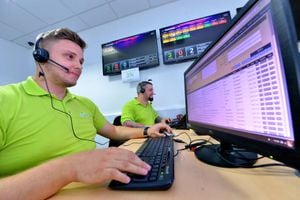
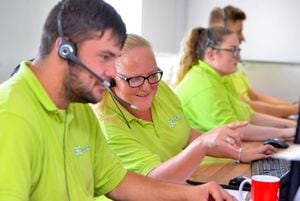
Mr Wilday, who began driving taxis in the early 1990s as a way to supplement his income as an ice cream man over the winter, says the past two years have seen massive changes in the way that people book taxis.
“Going back to the beginning of 2016, about 20 per cent of our bookings were by automated methods, either through a phone app, or by IVR, now it is above 50 per cent,” he says.
Integrated voice response, or IVR, is a system which will pick up calls from numbers it recognises as having used the service before, and give them an option of being able to book a taxi by pressing an option on their phone. While the number of IVR calls have remained fairly steady at about 20 per cent of business, the real growth has come in the use of smart phone apps, which now account for a third of all bookings made.
Different colours differentiate between the different methods of booking on the call handlers’ computer screens, with IVR calls being shown in blue, app bookings in orange, and conventional phone calls – still by some margin the biggest source of business – being shown in white.
Of course, the rise in the use of phone apps has presented the industry with something of a headache, in the shape of the controversial American app-based service Uber, which by not offering a conventional telephone service, manages to avoid the overheads of operating a call centre like that of Go Carz. Mr Wilday does not appear unduly concerned, at least not at the moment.
“Uber does not really operate in our area, it might touch a bit on Wolverhampton,” he says.
“If you look at Uber, it tends to do well in areas where there are lots of small companies operating 10 or 12 cars. Because they are phone-app only, they do not cater for anybody who does not have a smart phone, and they are credit-card based, while there are still many cash-only customers about. It has a socio-economic impact, Uber will do well in places like Birmingham and London where there will be a lot of company users, but We are able to cater for all customers, we accept payment by cash or card.”
All Go Carz drivers are self-employed and operate on a private-hire basis, which means that all taxis have to be pre-booked and its drivers cannot pick up passengers who hail them in the street.
Mr Wilday says the company continues to grow as the number of calls rise, and is looking to recruit more people in its call centre.
“We are taking anything in the region of 100,000 phone calls a week, which is a phenomenal volume, and our call handlers do a fantastic job to match those calls to vehicles for our customers.
“It’s a 24-7 operation, so we are always on the look-out for more staff and we would urge anyone interested to get in touch,” he says.


